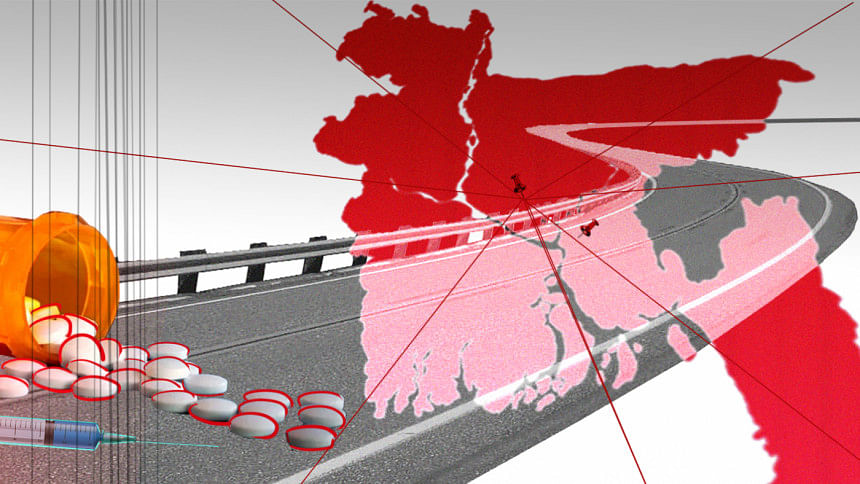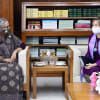Bangladesh tops the wrong ranking, again

Bangladesh turning into a hotbed for drug trafficking comes as no surprise given the country's geographic positioning that puts it at the centre of three major Asian drug trafficking routes: the Golden Wedge, the Golden Triangle, and the Golden Crescent. Add to that the incompetence of its authorities to bust well-connected and strategically-networked transnational trafficking rings as well as money laundering mechanisms that allow easy flow of illicit money abroad. The result: more than Tk 5,000 crore is laundered annually through drug trade out of the country, putting it at the top of the list of drug money laundering nations in Asia. Globally, Bangladesh ranks fifth, according to a report by the United Nations Conference on Trade and Development (UNCTAD). The UNCTAD estimates account for trafficking of drugs including methamphetamine tablets (yaba), heroin, buprenorphine, and phensedyl.
The staggering increase in the seizure of yaba alone – from 800,000 pills in 2010 to 45 million pills in 2022 – is an alarming manifestation of the incredible growth of illicit drug trade in the country over the past decade. Little has been done to really dismantle the system that allows this business to thrive. If we focus on yaba alone, in a country where more than seven million pills are sold every day (a 2021 estimate by police), worth a whopping Tk 210 crore, the 45 million pills seized in 2022 account for only six and a half days of trade.
Not that the authorities are doing nothing: they set up checkpoints, conduct regular drives, catch small shipments and recover drugs, catch drug peddlers, and ever since the launch of the War on Drugs, alleged drug dealers are also frequently "killed" in "gunfights" with law enforcement members. However, in terms of results, law enforcers have only so much to show.
The problem perhaps lies in our approach to the issue, which on the surface seems to target the consignments, users and dealers. Where we fail is in going deeper to the roots and dismantling the system at the core. The system we are talking about is one that allows rampant corruption, nepotism, favouritism and self-interest to permeate every level of the state, from policymaking to enforcement.
There are many reasons why drug lords are going about with their business scot-free. For one, the Narcotics Control Act seems to be a major obstacle in apprehending the drug lords as it stipulates that to bring a drug dealer or addict to book, drugs have to be confiscated in their possession. Practically speaking, it is always difficult to catch drug lords in possession of drugs; as a result, it is the dealers and peddlers who get caught during the drives.
In addition to this, we cannot rule out the possibility that due to the political affiliation and muscle of the big players, they are often deliberately left out of the drives. Take the case of the drug traffickers in Narayanganj – a transit point for drugs entering Dhaka and other nearby cities – who, despite being known and identified as drug bosses, are roaming out in the open. A Prothom Alo report details the identities of some of the 500-plus drug traders in Dhaka, many of whom are allegedly connected and affiliated with ruling party associate bodies such as Jubo League, Chhatra League and Swechchhasebak League, as well as the Awami League itself, along with Jubo Dal and Jatiya Party.
For instance, the report states that while Mir Hossain, general secretary of Swechchhasebak League's Kutubpur unit, tops the police list of narcotic traders in Fatullah, Narayanganj, and has been implicated in nine cases under various laws including the Narcotics Control Act, he has not been arrested as he has been holding a party post for a long time and also maintains his own force to manage drug trade.
While the government has launched a war on drugs, does it really have the political will to catch the drug lords, kingpins and mafia bosses who are pulling the strings and running the business behind the scenes?
And then there are known drug traders who have not even been named on the police list. Shakhawat Islam, former general secretary of Swechchhasebak League's Narayanganj city unit, for example, is a known drug trader, but he was not named on the list. Similarly, Jahangir Alam and his wife, known drug dealers facing lawsuits, have not been identified in the police list, apparently due to his good relations with the law enforcers.
Unfortunately, the Narayanganj landscape is pretty much a reflection of the overall drug trading scenario in Bangladesh. Even the ones killed across the country in drug-related "gunfights," "encounters," and "infighting" are not above controversy as instances of extrajudicial killings and suppression of political opposition.
Then there is the problem of the long-pending narcotic cases. Although the Department of Narcotics Control appointed 68 prosecutors across the country in 2019 to expedite disposal of long-pending cases and improve the conviction rate, and the parliament passed the Narcotics Control (Amendment) Bill, 2020, empowering any court with appropriate jurisdiction to try narcotic cases, a report by this daily last year found 73,312 cases still pending with the court. Conviction rates in narcotics cases have witnessed a constant fall since 2014, when it was 64 percent, to 40 percent in 2021, according to DNC's Annual Drug Report 2021.
At this point in time, it is important to take a closer look at our intention, appetite and approach regarding this issue. While the government has launched a war on drugs, does it really have the political will to catch the drug lords, kingpins and mafia bosses who are pulling the strings and running the business behind the scenes?
Drug lords are finding innovative ways – including manipulating the desperate Rohingya refugees – and new routes to bring drugs into the country. Without a well-planned strategy and comprehensive measures in collaboration with all relevant authorities, intelligence bodies and law enforcers, this well-oiled machine cannot be stopped. We need a holistic approach to bring down drug trafficking rings, despite their identities and affiliations. The deadly combination of a land offering ripe opportunities for drug trafficking and a lax system that provides enough loopholes for easy money laundering makes Bangladesh an easy target for international drug trafficking rings. It is high time we aimed at dismantling the system that enables criminals to line up their pockets at the cost of the nation, rather than focusing on small players.
On June 18, the High Court asked the DNC to submit within a month the names of top drug dealers, while directing the Anti-Corruption Commission, Bangladesh Financial Intelligence Unit and Criminal Investigation Department to investigate within two months the allegations of drug money being laundered abroad. Previously in 2021, as many as 14 government bodies flouted a similar High Court directive asking to submit names of persons and entities who stash money in foreign banks. Are the authorities concerned going to adhere to the High Court directive this time?
Tasneem Tayeb is a columnist for The Daily Star. Her Twitter handle is @tasneem_tayeb


 For all latest news, follow The Daily Star's Google News channel.
For all latest news, follow The Daily Star's Google News channel. 












Comments